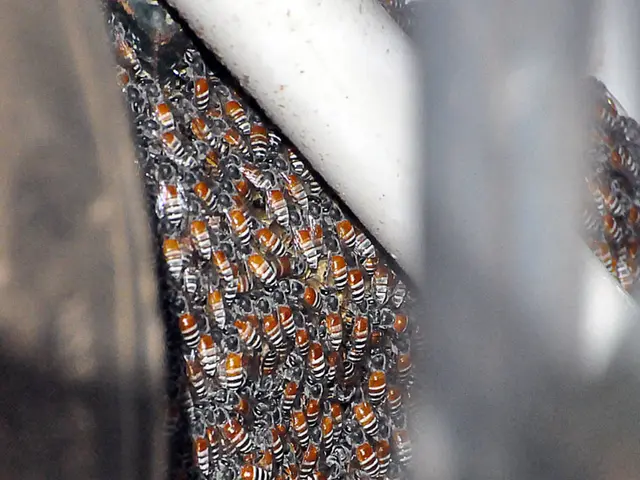A Shift in Tides: CDU's Historical Rift with the Left, Post-Chancellor Election Analysis
"Tuesday's CDU Incompatibility Verdict Makes Headlines"
In the aftermath of the Chancellor election in the Bundestag, the Union faction is engaging in discourse with the Left, signifying a possible end to the CDU's long-held incompatibility resolution.
Left Party leader Ines Schwerdtner declared to ntv.de that the Union's estrangement from her party post-election has ceased. "We congratulated Friedrich Merz on Tuesday and made it clear that he will still require our support," Schwerdtner stated. Although there's yet to be a direct dialogue with Merz, she asserts that the CDU's incompatibility resolution is essentially history since the day of the Chancellor election.
A Stale Resolution Upturned
The resolution, Schwerdtner suggests, is outdated and surmounted at the state level. "But I comprehend that there's an ideological obstacle for Merz," she explained. "He's already broken two central campaign promises concerning the debt brake and the special fund before his election as Chancellor, and now he's supposed to negotiate with the Left as well. That's a bit much for the CDU. However, reality will eventually catch up with Merz. The new coalition has already inscribed in the coalition agreement that it will reform the debt brake."
Schwerdtner remains open to negotiations with the Union, declaring, "No one in our party desires to negotiate with Friedrich Merz. But we converse with all democratic parties when needed, for instance, to achieve a reform of the debt brake."
The Enemy Within?
Schwerdtner assigns Merz the title of "class enemy" due to his former association with Blackrock. "I can hardly visualize that someone like that wouldbecome Chancellor," she asserted. When asked if Merz was "the class enemy," she replied in affirmation.
In the morning, the new Chancellor's chief of staff, Thorsten Frei, portrayed openness to abolishing the incompatibility resolution during an interview on ntv Morning Start. "We will need to discuss this together," Frei stated. The problem of organizing a two-thirds majority for the Chancellor election in the Bundestag had once again arisen. Although the resolution of the CDU federal party congress cannot be abolished with a stroke of the pen, "but we are certainly in a situation where we have to reassess one or two questions."
Sources: ntv.de, hvo
Through the Lens of History
The Christian Democratic Union (CDU) and the Left Party (Die Linke) have a complex and ideologically divergent relationship. Here's a glimpse into their history and the reasons behind their ongoing discord:
Historical Incompatibility
- Ideological Differences: The CDU is a center-right party that advocates for market-oriented economic policies and traditional social values. In contrast, the Left Party is a far-left party focused on social welfare, public ownership, and anti-militarism[5].
- Cooperation Ban: The CDU, along with its sister party CSU, has maintained a "no-cooperation rule" with the Left Party due to ideological differences, particularly on matters like defense spending and economic policies[3].
Current and Future Relations
- Post-Election Developments: Following the federal elections in February 2025, the CDU formed a coalition with the Social Democratic Party (SPD) to guarantee a majority government. This coalition did not involve the Left Party[1][4].
- Impact of Coalition Agreement: The current coalition agreement between the CDU/CSU and SPD hints that any constitutional changes or policy shifts necessitating broader support might require negotiations with other parties, including the Left. Nevertheless, given the CDU/CSU's "no-cooperation rule" with the Left, such collaboration could face significant hurdles[3].
- Future Relations: The lack of cooperation between the CDU and the Left Party suggests that future relations will likely remain strained. The coalition government will focus on navigating policies through their existing coalition without the need for direct involvement from the Left Party in decision-making[3][4].
In essence, although there are indications of potential need for broader support on certain policies, the CDU/CSU and the Left Party's historical and ideological disparities remain significant barriers to effective collaboration. The current coalition setup with the SPD allows the CDU/CSU to bypass direct negotiations with the Left Party.
- The Commission, as requested, has proposed a directive on the protection of workers from the risks arising from the use of electronic equipment, aiming to mitigate the incompatibility issues that have historically been a barrier in the CDU's relations with the Left Party.
- While the Union faction and the Left Party have engaged in discourse post-Chancellor election, Schwerdtner, the Left Party leader, declared Merz, the new Chancellor, "the class enemy" due to his former association with Blackrock.
- The enforcement of the resolution regarding incompatibility between the CDU and the Left Party is being questioned, as Schwerdtner and the Left Party have shown willingness to negotiate with the new government, especially on reforming the debt brake.
- The new Chancellor's policy agenda will likely involve significant reforms, including amending the debt brake, which may necessitate collaboration with political opponents like the Left Party, as stated by Merz's chief of staff, Thorsten Frei.








